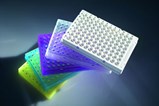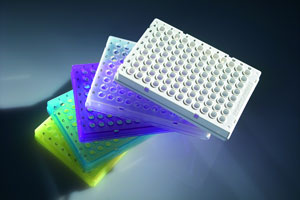Thermo Fisher Scientific Launches Affordable Non-Warping Pcr Plates For Reliable Automated Use

Epsom UK - Thermo Fisher Scientific Inc., the world leader in serving science, has launched a new range of single-shot moulded ultra-rigid polypropylene 96-well PCR plates which  allow scientists to eliminate the problem of disruption to workflow that is typically caused by plate warpage. The Thermo Scientific ABgene SuperPlate range comprises skirted and semi-skirted plates manufactured from a single material in a single process, whose structure has been specially engineered for rigidity.
allow scientists to eliminate the problem of disruption to workflow that is typically caused by plate warpage. The Thermo Scientific ABgene SuperPlate range comprises skirted and semi-skirted plates manufactured from a single material in a single process, whose structure has been specially engineered for rigidity.
Conventional plates are notoriously susceptible to warping as a result of the temperature changes to which they are subjected during thermal cycling. This frequently causes robotic PCR platforms to fail, and may also affect the way in which the fluorescence of PCR reactions is read, thereby compromising results integrity. By contrast, the new SuperPlates maintain all the advantages of polypropylene (low DNA/RNA/enzyme binding affinity, enhanced thermal transfer properties and high vapour retention), whilst at the same time offering a more efficient, even heat transfer with no warping.
"Scientists need no longer accept routine disruption of workflow caused by warped plates, and there is no need for them to buy expensive two-shot moulded products in order to avoid the problem", said Ben Jackson, PCR plastics product manager. "The superior performance of SuperPlates ensures the integrity of PCR results, and they work reliably with robotic systems."
The SuperPlate range features alpha-numeric grid referencing in raised black letters which are unaffected by rubbing or temperature changes and remain easy to see at all times. Customised bar coding of plates is also available, and the range includes plates to suit many different makes of thermal cycler. Users have the additional assurance of quality that comes from a product developed by Thermo Fisher Scientific's highly experienced R&D scientists and manufactured in state-of-the-art facilities in the UK.
SOURCE: Thermo Fisher Scientific Inc.
